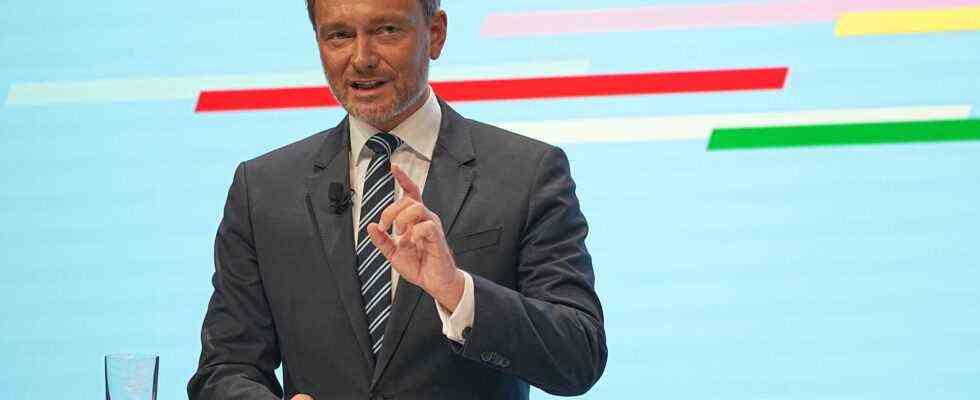analysis
Status: 02.12.2021 02:41 a.m.
In the election campaign, the FDP advertised its criticism of the tough Corona measures. Now the FDP is switching from the opposition to the government – and is jointly responsible for the corona policy. What consequences does this have for the image of the FDP?
Before the federal election, FDP leader Christian Lindner was not lacking in clarity about the corona: For those who have been vaccinated, recovered and also for those who tested negative, a lockdown must be excluded, Lindner explained in the ARD summer interview.
In line with this, the party’s election manifesto said: “We Free Democrats are committed to freedom, the rule of law and civil rights, which also apply in times of crisis and must not be dismissed as ‘privileges’ that may be granted or withheld from us at will.”
With its clear criticism of the Corona measures, the FDP was able to score, even with young voters who had experienced the lockdown first-hand. Many of these voters were also happy when Marco Buschmann, the parliamentary managing director of the FDP parliamentary group and designated Federal Minister of Justice, announced at a press conference with the SPD and the Greens at the end of October that all corona measures would end at the beginning of spring on March 20, 2022 at the latest should.
First the end of the epidemic situation, then the compulsory vaccination?
But no sooner had the SPD, Greens and FDP presented their plans to end the epidemic situation of national importance than the incidence values soared. And since then, the future governing party, the FDP, has barely kept up with the adjustment of its corona policy.
2G? Unimaginable in summer, it is no longer a problem for the party today. Contact restrictions for unvaccinated people? As well. And even a vaccination requirement is now considered by many liberals to be conceivable – which the FDP domestic politician Konstantin Kuhle justifies: “You can change your mind on such issues if the situation changes.”
Kuhle admits, however, that this is not easy for the FDP: “Because we have a special relationship with freedom and self-determination.” That is why one must carefully examine and argue for compulsory vaccination, be it for an institution-related or a general vaccination requirement. But if you prepare it carefully, “the FDP can certainly agree,” says Kuhle.
What sounds so stringent actually does not fit with the previous party line, not with the fundamental emphasis on individual freedom. Did the election manifesto say that the personal decision of each and every individual is respected, because it is the basis for people’s freedom.
The FDP in the traffic light coalition
The shift in the matter of Corona should not only be related to the changed Corona situation, but also to the change in position: away from the tough opposition banks to the government bank, as the political scientist Uwe Jun from the University of Trier says. In the future traffic light coalition, the FDP must also adapt to the coalition dynamics.
It was recently evident that first the Greens and then the SPD had pushed for a sharper pace with the corona measures. “This put the FDP on the defensive and must now probably give up not insignificant parts of its opposition rhetoric and opposition policy,” said Jun in an interview with the ARD capital studio.
The Free Democrats are also weakened in the matter of Corona by the defeat before the Federal Constitutional Court: They sued in vain against the federal emergency brake from the spring of this year. The Karlsruhe judges, however, had rejected both the constitutional complaints against the contact restrictions and the curfews as well as the complaints against the school closings on Tuesday.
Marco Buschmann, the designated FDP Justice Minister, had no choice but to prove himself to be a good loser. The FDP remains “party of fundamental rights, the constitution and the rule of law”. And in the rule of law, the rule is that a supreme court decision must of course be respected.
A crack for the image as a civil rights party?
The FDP had just regained its previously faded image as a party of civil rights through its positioning in the Corona issue – they wanted not only to be seen as an economically liberal party, but also to tie in with the tradition of a Gerhart Baum or a Sabine Leutheusser-Schnarrenberger. Is that going to falter again?
Konstantin Kuhle contradicts and refers to the coalition agreement with the SPD and the Greens, in which the issues of civil rights, social freedom and self-determination played a major role. In addition, the FDP does not only get the Ministry of Finance, but also the Ministry of Justice: “In this respect, it is guaranteed that the FDP, in addition to economic competence, also continues to stand for the rule of law.”
But how do you tell voters who may now be disappointed? The political scientist Uwe Jun from Trier points out the need to come to compromises in coalitions. Then the FDP would have the possibility to say that everything would have got worse in the government without the FDP. With which the party would come back to the discussions of 2017.
At that time, Christian Lindner justified the failure of the Jamaica explorations with the sentence that it was better not to govern than to govern wrongly. This time the motto should be: Better to rule than not to rule. In the hope that the image of the party will not be scratched again as it was when it was involved in government between 2009 and 2013. After that, the FDP was thrown out of the Bundestag for the first time in the history of the Federal Republic.

